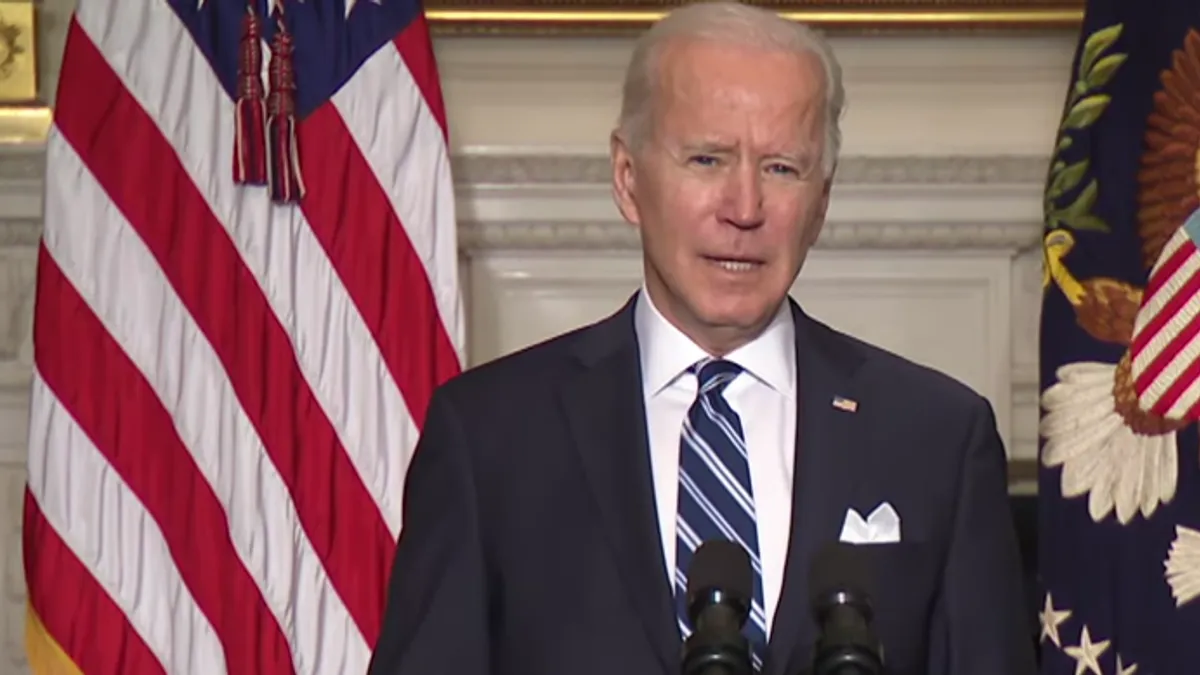Dive Brief:
- President Joe Biden on Wednesday met with union leaders to get input on his forthcoming infrastructure plan, while nominating a new head of the National Labor Relations Board and rolling back a Trump-era apprenticeship program.
- Among those present were several heads of construction-related unions including Richard Trumka, the president of the AFL-CIO; Sean McGarvey, president of North America’s Building Trades Unions; and Lonnie R. Stephenson, the international president of the International Brotherhood of Electrical Workers, who served on Biden’s transition advisory board.
- During the meeting, Biden called the union representatives “real friends” and “the folks who brung me to the dance,” according to the White House. Biden outlined the dire need for infrastructure investment across the country, and labor's role in building it. "I said from the beginning of my campaign, throughout my whole career: The middle class built this country, and labor built the middle class. And I think we have an incredible opportunity to make some enormous progress in creating jobs — good-paying jobs, Davis-Bacon and prevailing wage jobs — to rebuild the infrastructure of this country in a way that everybody knows has to be done."
Dive Insight:
The president described the United States as ranked “like 38th in the world in terms of infrastructure, everything from canals to highways to airports.” He said the country must do “everything we can do and we need to do to make ourselves competitive in the 21st century.”
He is expected to provide details for his multitrillion dollar Build Back Better infrastructure program during his State of the Union address on Feb. 23.
While Biden received pushback and criticism from unions for rescinding the Keystone XL oil pipeline’s permit on his first day in office at the cost of thousands of jobs, he will need union support to push through his infrastructure initiative. Similar proposals from former presidents Barack Obama and Donald Trump early in their administrations languished in Congress.
The other labor leaders in the meeting yesterday were:
- James T. Callahan, general president, International Union of Operating Engineers.
- Eric Dean, general president, Iron Workers International Union.
- Robert Martinez, Jr., international president, International Association of Machinists and Aerospace Workers.
- Mark McManus, general president, United Association Union of Plumbers, Fitters, Welders, & Service Techs.
- Terry O’Sullivan, general president, Laborers’ International Union of North America.
- Kenneth E. Rigmaiden, general president, International Union of Painters and Allied Trades.
- Elizabeth H. Shuler, secretary-treasurer, AFL-CIO.
Other construction-related groups are calling for infrastructure spending that does not necessarily depend on union jobs. For example, the Associated Builders and Contractors sent Biden a letter on Feb. 4 urging him to address a projected $2.6 trillion infrastructure spending deficit by 2029, but to do so without implementing project labor agreements on government projects.
Apprenticeship changes
In other labor moves on Wednesday, Biden nominated Jennifer Abruzzo to head the National Labor Relations Board, a federal agency charged with enforcing labor laws and safeguarding workers’ right to organize.
Abruzzo will need to be confirmed by the Senate, and could face a less friendly atmosphere than Transportation Secretary Pete Buttigieg in his own confirmation hearings.
Biden forced out Trump appointee Peter Robb from NLRB last month, even though his tenure was slated to run through November, a move Republicans have sharply criticized.
Biden also moved on Wednesday to revoke Trump’s executive order that created the Industry-Recognized Apprenticeship Program, in favor of registered apprenticeships as outlined in the proposed National Apprenticeship Act. He also asked the Department of Labor to reinstate the National Advisory Committee on Apprenticeships to oversee the development of those registered apprenticeship programs.
Democrats have criticized the Trump-era Industry-Recognized Apprenticeship Program as lacking government oversight that ensures proper training, while doing less to make the programs open to minorities and women.
“Industry-recognized apprenticeship programs have fewer quality standards than registered apprenticeship programs,” read a statement on the White House website detailing the proposal. “For example, they fail to require the wage progression that reflects increasing apprentice skills and they lack the standardized training rigor that ensures employers know they are hiring a worker with high-quality training.”














